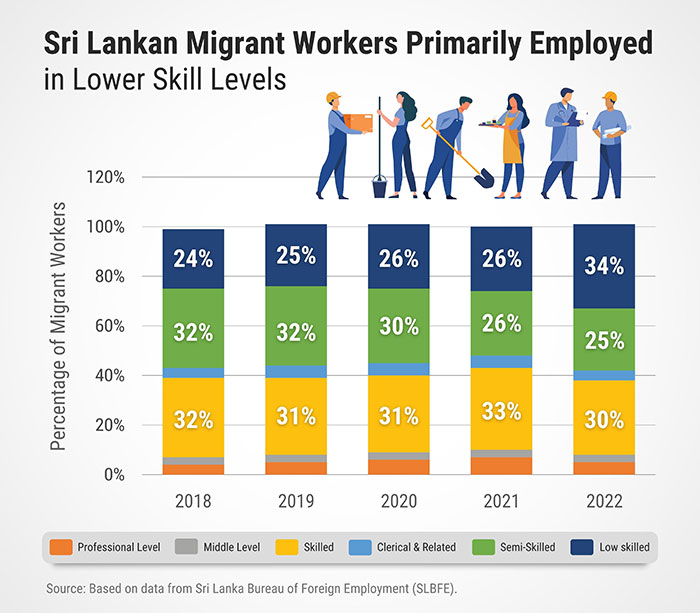Business
Skills Beyond Borders: Are Sri Lankan returnee migrant workers equipped for migration triumph?

 Piyumi Ranadewa is a Research Assistant working on migration and urbanisation policy research at IPS. She holds a BSc (Hons) in Agriculture, specialising in Agriculture Economics and Business (First Class) from Wayamba University of Sri Lanka, graduating with Dean’s Honours. She also holds a Master of Agri-Enterprise and Technology Management from Wayamba University of Sri Lanka. Her research interests include urbanisation, tourism, green economy, climate change and agribusiness value chains. (Talk with Piyumi – piyumir@ips.lk)
Piyumi Ranadewa is a Research Assistant working on migration and urbanisation policy research at IPS. She holds a BSc (Hons) in Agriculture, specialising in Agriculture Economics and Business (First Class) from Wayamba University of Sri Lanka, graduating with Dean’s Honours. She also holds a Master of Agri-Enterprise and Technology Management from Wayamba University of Sri Lanka. Her research interests include urbanisation, tourism, green economy, climate change and agribusiness value chains. (Talk with Piyumi – piyumir@ips.lk)
By Piyumi Ranadewa
“I can speak the language and based on my previous experiences, I believe I can handle the work once I remigrate, and I don’t need further training,” says Ms Herath Manike from Maho in Kurunegala. She has previously migrated to Kuwait and Jordan as a domestic housekeeping assistant and is now contemplating re-migration.
Returnee migrant workers often possess a wealth of knowledge and skills acquired during their time overseas, leading them to feel adequately equipped for the global job market. However, in today’s rapidly evolving international job market, adaptability and acquiring new skill sets are essential for sustained career growth. Relying solely on existing skills can lead to complacency and hinder long-term prospects. Continuous up-skilling can open doors to more stable and higher-earning employment opportunities. The Global Compact for Safe, Orderly and Regular Migration (GCM) also underscores the necessity to invest in skills development and promote mutual recognition of skills, qualifications, and competencies.
A recent study by the Institute of Policy Studies of Sri Lanka (IPS) for Skilled and Resilient Migrant Workers (SRMW) project focusing on 511 return migrants in Sri Lanka revealed that among the surveyed participants, 56% of respondents had taken steps towards re-migration, and 193 are considering re-migration within 2023. Notably, among them [out of 193), 68% have not pursued further formal training. Moreover, 84% of these respondents believed their current skills were sufficient for overseas employment. As Sri Lanka unveils its Labour Migration Policy 2023-2027, it is timely to shed light on the importance of skill development for re-migration.
The Context: Potential for Upskilling
In Sri Lanka, migration is seen as a promising pathway to improved job opportunities, as evident from the recent long queues at passport offices. A significant proportion of Sri Lankan migrant workers were in semi-skilled and low-skilled categories. Most labour migrants are concentrated in Middle Eastern countries, which are common destinations for both skilled and unskilled workers. This aligns with the study findings, which indicated that many of these migrants were engaged in elementary occupations (domestic workers and other low and semi-skilled categories) during their recent overseas employment.
Although most re-migrants from Sri Lanka have been employed in lower-skilled jobs, they have great potential to improve their prospects by acquiring new skills through upskilling. However, the practice of upskilling is not widespread among this group. For example, Sri Lanka predominantly relies on foreign domestic workers among its migrant workers. However, there is a growing demand for specialised services like nursing and elderly care. These specialised jobs often offer better pay than foreign domestic workers. Enhancing the skills of returning domestic workers can open up job opportunities in sectors beyond domestic work, particularly in healthcare.
Reluctance for Skill Development
Ms Manike, who pursued a small coir business after her recent migration, is now facing economic difficulties that have led her to consider re-migration. However, she hesitates to participate in skill development programmes, driven by her immediate need to generate income through migration and her confidence in her past experience. Therefore, her primary focus is on addressing urgent financial needs, leaving limited space for dedicating time and effort to upskilling.
Similar to Manike’s perspective, most returnee migrant workers planning to remigrate believe their previous training or experience from overseas would suffice, overlooking the need for continuous skill upgrading. Furthermore, in scenarios where re-migration is not voluntary but a necessity due to compelling circumstances, individuals may be forced to re-migrate without the opportunity or motivation to upgrade skills to pursue better employment opportunities overseas.
If returnee migrant workers consider upskilling, many often opt for informal training or overlook skill development due to perceived opportunity costs and age-related barriers associated with formal skill training programmes available in the country. They fear that dedicating time and resources to formal training might not yield immediate returns on investment, leading them to choose informal learning options instead. Additionally, age-related concerns can make some migrant workers reluctant to enrol in formal training, as they feel they are past the ideal age for learning new skills.
Another significant barrier to skill development for returning migrants is the lack of targeted and tailored training programmes. For instance, during a Focus Group Discussion (FGD) conducted in Anuradhapura, reluctance to undergo formal training on the grounds that there is no suitable training available in Sri Lanka for the specific machines used while working abroad, was cited as an example. As these workers aspire to find better opportunities upon their return, access to advanced and customised training becomes a pivotal factor in their career growth.
Skill Gap and Awareness
While Sri Lanka has taken many steps to provide support services for upskilling and skill recognition for migrant workers, such as the recent collaboration between the SLBFE and the Vocational Training Authority (VTA) to offer specialised training tailored to foreign employment needs, concerns remain regarding the effective dissemination of vital information to the intended beneficiaries.
As found in the IPS’ study, while a majority of respondents have completed their education up to Grade 10, surprisingly, only 20% were aware of National Vocational Qualification (NVQ) levels. Although returnee migrant workers tend to favour informal training, a notable 76% (out of 511 individuals) had not acquired Recognition of Prior Learning (RPL) credentials. These credentials serve to formally acknowledge the skills acquired through informal means. This highlights a significant gap and lack of awareness regarding formal skill development and recognition among the respondents.
The Way Forward
While the self-perceived competence of returnee migrant workers is a positive attribute, relying solely on existing skills without further training and formal recognition of available qualifications may hinder the personal and professional growth opportunities of returnee migrant workers. Therefore, it is crucial to foster a culture of lifelong learning and skill development to support returnee migrant workers in their re-migration journey and enable them to thrive in a dynamic job market. This involves creating awareness about the importance of ongoing education and training and providing accessible and relevant learning opportunities. Some recommended strategies include:
Improve dissemination of information and guidance about skill development programmes and raise awareness about the importance of upskilling,
Facilitate awareness and accessibility to available skill development programmes through easily accessible user-friendly platforms like websites or mobile applications.
Foster collaboration between the public and private sectors and educational institutes to develop targeted training programmes specifically tailored for migrant workers planning to remigrate. These programmes should align closely with industry needs and incorporate hands-on experience.
Establish networking and mentorship programmes that connect migrant workers with professionals in their fields, providing guidance, collaboration opportunities, and skill enhancement support.
Promote existing RPL and accreditation of informal skills, encouraging migrant workers to pursue upskilling opportunities.
Link to original blog: https://www.ips.lk/talkingeconomics/2023/09/11/skills-beyond-borders-are-sri-lankan-returnee-migrant-workers-equipped-for-migration-triumph/
Business
AHK Sri Lanka champions first-ever Sri Lankan delegation at Drupa 2024

The Delegation of German Industry and Commerce in Sri Lanka (AHK Sri Lanka) proudly facilitated the first-ever Sri Lankan delegation’s participation at Drupa 2024, the world’s largest trade fair for the printing industry and technology. Held after an eight-year hiatus, Drupa 2024 was a landmark event, marking significant advancements and opportunities in the global printing industry.
AHK Sri Lanka played a pivotal role in organising and supporting the delegation, which comprised 17 members from the Sri Lanka Association for Printers (SLAP), representing eight companies from the commercial, newspaper, stationery printing, and packaging industries. This pioneering effort by AHK Sri Lanka not only showcased the diverse capabilities of Sri Lanka’s printing sector but also facilitated vital bilateral discussions with key stakeholders from the German printing industry.
Business
Unveiling Ayugiri: Browns Hotels & Resorts sets the stage for a new era in luxury Ayurveda Wellness

In a captivating reimagining of luxury wellness tourism, Browns Hotels & Resorts proudly unveiled the exquisite Ayugiri Ayurveda Wellness Resort Sigiriya. This momentous occasion, celebrated amidst a vibrant and serene grand opening on the 6th of June, heralds a new chapter in the Ayurveda wellness tourism landscape in Sri Lanka. Nestled amidst 54 acres of unspoiled natural splendour, Ayugiri features 22 exclusive suites and stands out as the only luxury Ayurveda wellness resort in the country offering plunge pools in every room, rendering it truly one-of-a-kind.
The grand opening of Ayugiri Ayurveda Wellness Resort was an enchanting event, where guests were captivated by the melodies of flutists and violinists resonating through Sigiriya’s lush landscapes. As traditional drummers and dancers infused the air with vibrant energy, Browns Hotels & Resorts’ CEO, Eksath Wijeratne, Kotaro Katsuki, Acting Ambassador for the Embassy of Japan and General Manager, Buwaneka Bandara, unveiled the resort’s new logo, marking a significant moment witnessed by distinguished guests from the French Embassy, Ayurveda and wellness enthusiasts along with officials from the Sigiriya area, LOLC Holdings and Browns Group.
“Our strategic expansion into wellness tourism with Ayugiri Ayurveda Wellness Resort Sigiriya symbolises a significant milestone for Browns Hotels & Resorts. Wellness tourism has consistently outperformed the overall tourism industry for over a decade, reflecting a growing global interest in travel that goes beyond leisure to offer rejuvenation and holistic well-being. By integrating the timeless wisdom of Ayurveda with modern luxury, we aim to set a new standard in luxury wellness tourism in Sri Lanka. Whether your goal is prevention, healing, or a deeper connection to inner harmony, Ayugiri offers a sanctuary for holistic well-being” stated Eksath Wijeratne.
Ayugiri encapsulates the essence of life, inspired by the lotus flower held by the graceful queens of the infamous Sigiriya frescoes. Just as the lotus emerges from the murky depths, untainted and serene,
Ayugiri invites guests on a journey of purity and rejuvenation, harmonised with a balance of mind, body and spirit, the essence of nature, echoes of culture and the wisdom of ancient Ayurvedic healing.
Business
HNB General Insurance recognized as Best General Bancassurance Provider in Sri Lanka 2024

HNB General Insurance, one of Sri Lanka’s leading general insurance providers, has been honored as the Best General Bancassurance Provider in Sri Lanka 2024 by the prestigious Global Banking and Finance Review – UK.
The esteemed accolade underscores HNB General Insurance’s unwavering commitment to excellence and its outstanding performance in the field of bancassurance. Through dedication and hard work, the HNB General Insurance team has continuously endeavored to deliver innovative insurance solutions, cultivate strong relationships with banking partners, and provide unparalleled service to customers nationwide. This recognition is a testament to the team’s dedication and relentless pursuit of excellence in the bancassurance business.
“We are honored to receive this prestigious award, which reflects our team’s tireless efforts and dedication to delivering value-added insurance solutions and exceptional service through our bancassurance partnerships,” said Sithumina Jayasundara, CEO of HNB General Insurance. “This recognition reaffirms our position as a trusted insurance provider in Sri Lanka and motivates us to continue striving for excellence in serving our customers and communities.”












